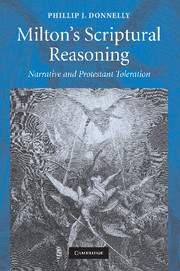
-
Select format
-
- Publisher:
- Cambridge University Press
- Publication date:
- September 2009
- February 2009
- ISBN:
- 9780511575617
- 9780521509732
- 9781107404519
- Dimensions:
- (228 x 152 mm)
- Weight & Pages:
- 0.57kg, 278 Pages
- Dimensions:
- (229 x 152 mm)
- Weight & Pages:
- 0.38kg, 278 Pages
You may already have access via personal or institutional login
Book description
John Milton's major poems have long provoked wide-ranging judgements about the purposes of his biblical engagement. In this elegant and insightful study, Phillip J. Donnelly transforms our common perceptions about Milton's writing. He challenges the traditional assumption that the poet shared our modern view that reason is a capacity whose purpose is to control nature. Instead, Milton's conception of reason - both human and divine - is bound up with a poetic sense of difference, a capacity for being faithful to a goodness and beauty that survives the effects of human frailty in the fall. Providing fresh new readings of Paradise Lost, Paradise Regained and Samson Agonistes, Donnelly gives us important new perspectives on Milton's aesthetics, theology and politics.
Contents
Metrics
Altmetric attention score
Full text views
Full text views help Loading metrics...
Loading metrics...
* Views captured on Cambridge Core between #date#. This data will be updated every 24 hours.
Usage data cannot currently be displayed.
Accessibility standard: Unknown
Why this information is here
This section outlines the accessibility features of this content - including support for screen readers, full keyboard navigation and high-contrast display options. This may not be relevant for you.
Accessibility Information
Accessibility compliance for the PDF of this book is currently unknown and may be updated in the future.


